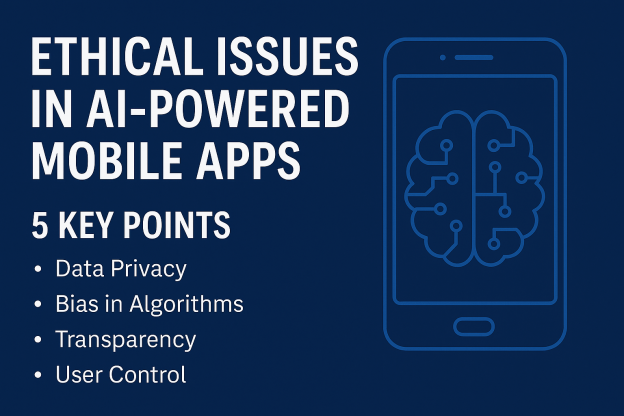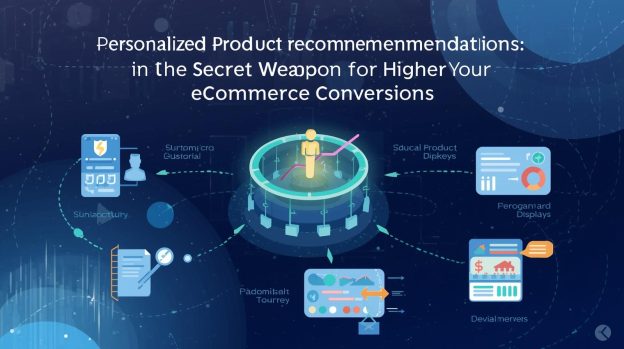The Dark Side of AI in Mobile Apps: 5 Ethical Challenges in 2025

You must have encountered several health and fitness apps using AI. Artificial intelligence is transforming the landscape of mobile applications. The use of AI in mobile apps provides more personalised and convenient experiences to customers. Apart from health/fitness apps, many other mobile apps use AI, like social media platforms, shopping sites, gaming applications and virtual assistants. One common aspect in all AI-powered apps is user data. When we talk about user data, we must address the ethics of AI in mobile apps.
We are way past the debate of AI being a boon or a bane. This is because AI is already in our lives. It exists in our digital devices, applications and websites. AI is an allowed intruder which keeps your data, uses it to process information and provides intelligent insights – all for you. But how does AI create ethical dilemmas? Is the prevalent use of AI in mobile apps hurting you in any way? Does it compromise ethics? What challenges does it pose?
In this article, we will shed more light on the core ethical issues posed by AI-powered apps. Additionally, we will explore five key points to consider when developing an AI-powered application. Let’s begin by understanding what AI ethics is.
AI Ethics
Ethics is a set of moral principles that distinguishes between right and wrong. AI Ethics is a multidisciplinary field that establishes guidelines for AI. These principles ensure that AI use aligns with human values and benefits society as a whole. AI Ethics also ensures that AI maintains key aspects of fairness, accountability, responsibility, privacy and security in any application.
In many cases, AI technology taps into the personal information of users without their consent. It shows unfair use of AI and necessitates the implementation of strict protocols against such actions. But these days, there are many mobile and web applications using AI. How do you make sure that your data within these apps remains private & protected?
Surprisingly, the actions we can take are more inclined towards avoiding the risk rather than mitigating it. For such scenarios, IT experts advise that you protect your data, limit data sharing and manage data permissions. Let’s understand how AI poses ethical issues, especially in AI-powered apps that we interact with daily.
Ethical Concerns in AI-powered Apps
Bias in AI Algorithms
The first risk is related to bias in AI algorithms. Machine learning is a branch of AI which focuses on enabling computers to imitate the way humans learn. The AI model trains on vast amounts of data. One of the dominant issues with AI is algorithmic bias, i.e., AI will show preferences for one over another. The bias can originate from various sources, like flaws in algorithmic design and skewed training data.
For instance, organisations are adopting an AI-powered resume filtering app to filter job applications. A CNN article highlights that over 48% of hing managers use AI to screen resumes. The application will filter and sort resumes based on the skills and experience of individual candidates. Using skewed data in the model training will result in skewed results. If the dataset shows more men taking the job of a technical role, the AI model will filter the resumes with this bias. This means that the AI model will filter and shortlist more men’s resumes as compared to a woman’s. This is algorithmic bias. In this case, the AI shows a preference for men as they were predominantly hired for technical roles in the past, as compared to women.
Privacy Risk in AI Apps
AI technology depends on massive datasets to train its models. The issue lies in using private and confidential data to train the AI models. We interact with many AI applications on a daily basis, like shopping sites (Amazon, Flipkart, etc), streaming platforms (Netflix and Apple TV), etc. There is no knowing how these apps use our data. Privacy risks hamper individual privacy rights by using their data without their knowledge.
However, many AI applications provide a privacy policy entailing the use of personal data. But the problem lies in transparency. AI models do not show how they collect or use data, which is concerning for most individuals. For instance, surveillance systems for road traffic management use AI to detect accidents, monitor traffic and optimise its flow. The user data may be sensitive, and the AI systems do not take consent for collecting data. These uninformed practices of data collection make AI less trustworthy.
Lack of Transparency and Accountability
AI is indeed changing the way you interact with applications. It makes your search more efficient, provides intelligent insights and allows voice-based interactions. Even shopping online is more fun. AI shows you the products you like, and it is possible because AI-based personalised recommendations exist.
Many e-commerce and streaming platforms use AI to make the user experience more effective. But what happens when AI mistakenly suggests to you the wrong data that leads to adverse consequences? For example, purchasing a product on AI recommendation, but it wasn’t in stock to begin with. Who takes accountability for this action and deals with customer frustration post-purchase? The human customer care resolves this by refunding the amount and cancelling the order. This is an example showing how humans take accountability. But it is clear from this example that AI lacks accountability and transparency, which is an ethical issue.
AI models work like a black-box. There is no way of interpreting what goes behind it. This mechanism of AI becomes a problem when companies, governments or any authorities take crucial decisions based on AI. Do we hold organisations and the government accountable for the outcome or AI itself? On the other hand, there is no transparency in AI. People can’t tell why AI made a certain decision and how. Hence, the lack of accountability and transparency in AI apps is an ethical issue that may affect individuals more dominantly in future if not today.
Key Points to Consider When Developing AI-powered Apps
Developers must realise that AI security is becoming a huge concern for individuals. It is their duty as well to provide responsible AI. To ensure this, there are some key points to consider when developing AI-powered apps.
Privacy Protection
Developers must train AI models using privacy-preserving technologies. The technologies like differential training and federated learning. With federated learning, developers can train an AI model on decentralized devices. This means that the AI model will use data on local devices and servers holding local data, without using a centralised location. The AI model does not store the raw data from local devices and services. Hence, it allows for a greater privacy measure taken against ethical issues.
Addressing Bias & Fairness in AI App Development
Developers can address bias by improving data collection practices. It is crucial to analyse the datasets before their use in AI model training. Implementation of fair audit using interpretability tools will help unmask any hidden bias in the dataset. It is a developer’s job to eliminate the AI model to avoid any discrimination based on factors like gender, race, ethnicity, etc. Hence, using a diverse dataset will ensure fairness in AI model training and its respective outcomes.
Developing a Code of Ethics
Developers should have a code of ethics of their own for AI app development. It defines the principles and values the AI system will follow. The development of a code of ethics to follow in AI app development should be done by collaborating with relevant and direct stakeholders. These stakeholders can range from the project owner, customers, employees, and industry experts.
Promote Trust, User Control & Autonomy
Users should have complete control over their data. For instance, many users would not have an issue with data sharing as long as it does not contain personal details like email ID, bank account information, etc. Ask users if you can record their data for AI model training. This will enhance user trust and will provide them with control over their data.
Legal Compliance & Standards
Currently, in India, there are no exclusive laws governing AI. Niti Aayog, or the National Institution for Transforming India, is a policy think tank established by the Indian government. In their approach paper, Niti Aayog reflects on their national strategy on AI. The paper highlights Niti Aayog’s efforts towards ensuring the ethical and responsible use of AI. They are establishing broad ethical principles for designing, developing and deploying AI in India. In addition, developers must abide by legal compliance and standards to create AI-integrated apps.
To Sum Up
The advancements in AI will continue to evolve. With the rapid development of AI apps, it’s more crucial now than ever to invest in responsible AI. This will ensure that going forward, you can enjoy using AI-powered apps without worrying about your data. More transparent AI mechanisms will increase user trust, which will enable long-term AI use.
If you need a robust AI-powered app development strategy, consult our experts at VerveLogic. Our team has successfully delivered holistic AI apps in IT, healthcare, retail and manufacturing domains. We will be thrilled to assist you with your mobile application development needs.
FAQs
Are there ethical issues in social media apps due to AI?
There are several ethical issues in AI-powered social media apps related to accountability, consent, privacy and transparency. Users are not aware of their digital rights, which keeps them in the dark about AI using their data.
What are the 5 key aspects of AI ethics?
The 5 key aspects of AI ethics include privacy and security, accountability, fairness, transparency, reliability and safety.
How do you ensure safety in AI-powered mobile apps?
It is possible by keeping multi-factor authentication on your accounts. Choose strong passwords and always change them frequently.



